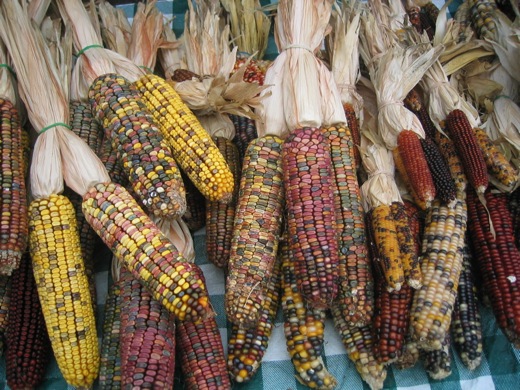
In last week’s Time Out Chicago David Tamarkin describes all that is wrong with the localvore movement, likening it to a dangerous cult, which careless, self-centered, trend-obsessed people are blindly joining. The article is offensive and silly for a number of reasons, not the least of which is the irritating illustration which accompanies the text.
The article is an attack on the Green City Market’s annual Localvore Challenge (September 10-24) in which Chicagoans are encouraged to eat locally for two weeks. Tamarkin claims that people joining the localvore movement are giving up their “Belgian chocolates” and not eating any goods produced outside of their locale, this then leads him to very rudimentary lessons on trade and transportation and how this decision is hurting farmers in other countries. Like most people, I always viewed the challenge as an inspirational action rather than the start of a lifestyle completely void of non-local products, and in fact on the challenge’s website it tells participants to decide which exceptions they wish to make and suggests things like sugar, salt, pepper, spices, olive oil, coffee and tea. The localvore movement has always seemed to me like an inclusive group which encourages everyone to participate in whatever way is appropriate for them, whether that means accepting the challenge or simply shopping at the Green City Market once a week for produce.

He also attacks the localvores’ environmental arguments, which often cite the fuel and other resources that go into the transportation of foods globally, and explains to us that even things grown locally might have been grown under environmentally unsound conditions. I believe that most people who are trying to consume more local foods are also very aware of how those foods were raised and would avoid things that came from “heavily heated, gas-guzzling greenhouses” —I certainly do.
What is perhaps most offensive to me about the article is that he describes the localvore movement as just another fad diet that these careless people are blindly following. It seems really strange that Tamarkin finds this group so threatening. We are living in a country with a failing economy, a failing war and a failing political system where most people eat industrialized food from corporate supermarkets and yet Tamarkin chooses to pick on people who are, even by his own estimates, trying to do good and live responsibly. People who are most likely very aware of each food choice they make and look at every decision as an opportunity to behave responsibly, whether that means growing things yourself, buying locally or buying fair-trade. I do not think the people choosing to participate in this movement, to whatever extent, are doing so blindly or because it is trendy. How we purchase and consume food has become a complicated political choice. These people should be commended for taking this choice seriously.




Alice says:
December 9th, 2008 at 3:43 pm
Thanks, Tim, for this very sensible take. We have to make choices, and I agree that the goal is intelligent reflection. For example, I would rather buy meat that is humanely raised than raised locally. We are lucky to be able to buy lamb directly from a local farmer, who raises the lambs mostly to train sheep dogs. Her lambs are humanely and organically raised. This means for recipes where I would ordinarily use beef, I use lamb, and I skip beef recipes for which a lamb substitute doesn’t work. Anyway, great post, thank you!